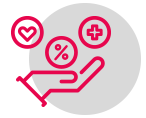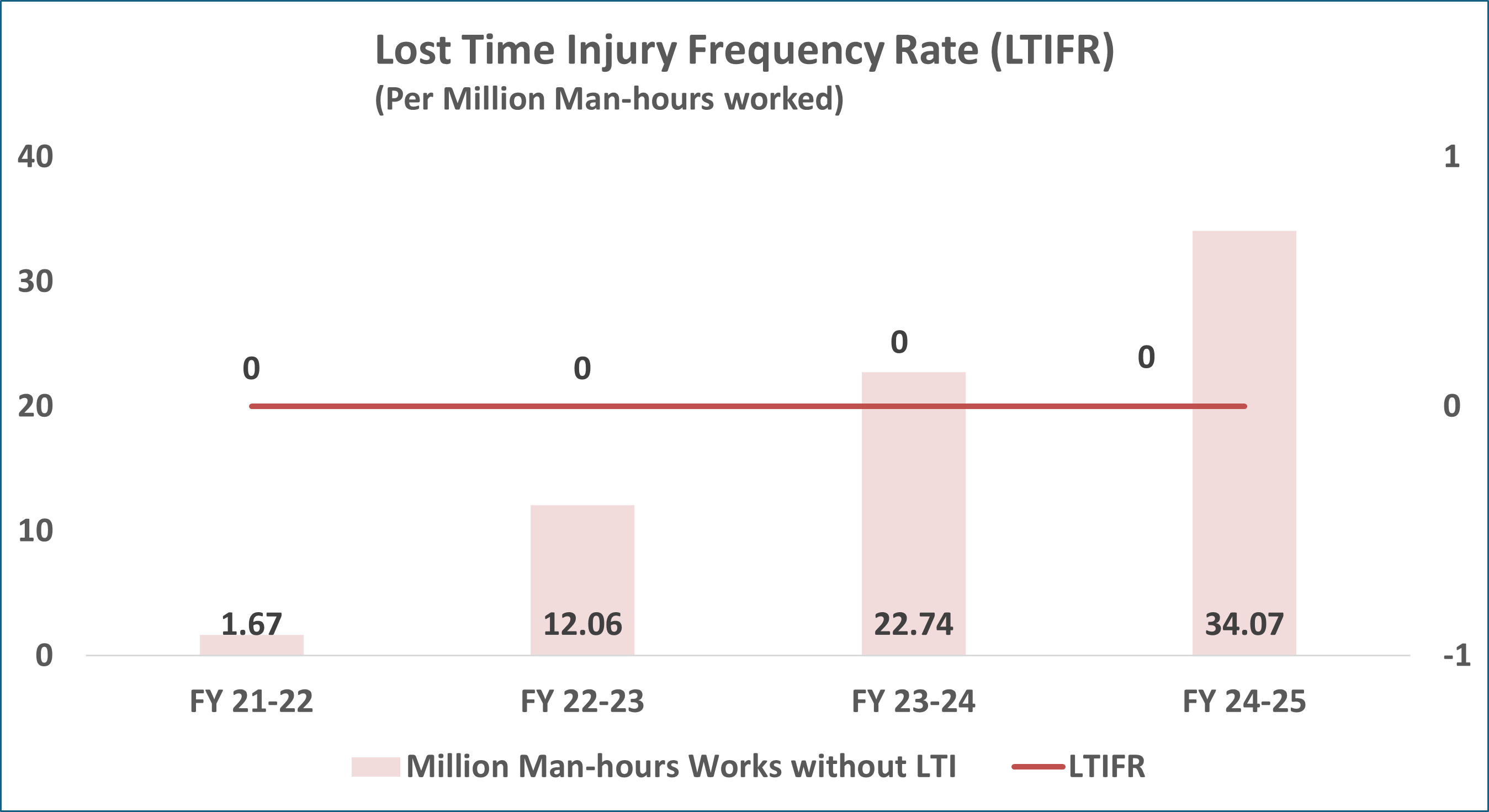
A holistic approch
To sustainability.
EMPLOYMENT & SOCIAL ASPECTS




GRI Standards
| GRI 401: Employment | Section/Comments | |
|---|---|---|
| GRI 103-1 | Management approach: Explanation of the material topic and its boundary | |
| GRI 103-2 | Management approach: The management approach and its components | |
| GRI 103-3 | Management approach: Evaluation of the management approach | |
| GRI 401-1 | New employee hires and employee turnover | New Employees Hired: 1115 Employee Turnover: 837 Ref. BRSR Section A- General Disclosures for Employees (20 & 22)” |
| GRI 401-2 | Benefits provided to full-time employees that are not provided to temporary or part-time employees | Employee Benefits (Note 32, 39) |
| GRI 401-3 | Parental leave | 151 female employees were entitled to parental leave |
KNPL employees

KNPL's diverse workforce comprises of different age groups, gender, religion, nationality, intellectual abilities and professional backgrounds. It focusses on creating a stimulating work environment, supported by a caring and compassionate work ethos to enable employees to thrive and deliver winning performance.
| Gender-wise | Age-wise | ||||
| Male | Female | <30 years | 31-50 years | >50 years | |
| Permanent Employees | 3708 | 151 | 1010 | 2494 | 355 |
As of the end of FY 2024–25, the total number of contractual manpower (both permanent and non-permanent) was 6,716, comprising 6,525 males and 191 females.
Our focus on Gender Diversity

At KNPL, we prioritize fostering diversity and inclusivity by advancing opportunities for our colleagues, culture, and communities, and we ensure that there is no discrimination based on gender, race, age, religion, or ethnicity.
Our progress includes achieving 4.5% gender diversity among permanent employees, excluding workers, and 3.8% among permanent employees, including workers. Additionally, we hired one differently abled candidate in FY 2023-24, increasing the total count to two, encompassing both existing and new hires.
Employee Training and Development

At KNPL, we don't just offer jobs, we offer a learning experience like none other. We persistently aim to accomplish an atmosphere of edification and enlightenment. Through catalyst for development, we endeavour to create a culture of Collaboration, Innovation and Empowerment.
Categories of Training:

Induction Training - Induction training is provided to new hires as an initial preparation for their new position.

Competency based Training - Competency Based Training emphasizes on enhancing the competencies required by a person for a particular job and position, in order to achieve individual growth and organizational goals.

Functions specific Training - Functional Training aims at upgrading the employees’ functional knowledge to keep up with the ongoing internal and external changes, which affects the day to day working in the short run and the individual & organizational growth in the long run.

Skill Development program - Skill Development programs aims at upgrading and multi skilling the employees’ current skill level by means of Work Instructions, Standard Operating Procedures and Single Point Lessons.

Compliance Training - This is designed to brief employees about key aspects of policies covered under compliance training (Code of Conduct, Code of Conduct for Affirmative Action, Whistle Blower, Appropriate Social Conduct at Workplace, Health-related Ailment Policy) and queries related to the policies are addressed. Awareness is also provided on grievance and complaint redressal mechanism.

Safety Training - To instil a safety culture in the organisation, various thematic safety trainings and competitions such as Kiken Yochi Trainings (KYT), Danger Experience Programme (DEP), Life After Accident (LAA) exercise, trainings on static electricity and human error prevention, online safety tests, safety quiz, and CAPA completion at various levels are conducted.
Sales Trainings:
- KNPL has launched Percipio, a digital academy, to provide upskilling opportunities for employees.
- L&D teams ensure employees have access to virtual mediums for learning opportunities.
- Planned events such as seminars, learning programs, and self-learning modules keep employees connected throughout the year.
- The Product Master Class initiative focuses on continuous learning and upskilling, with subject matter experts sharing their views on technical subjects once a month.
- The Sales Competency Enhancement Programme offers comprehensive training to the sales team on various topics, including the paint industry, technical aspects, product training, scheme management, stakeholder management, digital training, and self-management.
- Nerolac's flagship programme engages with painters and contractors, offering benefits and schemes, including direct transfer of rewards to painters' bank accounts in real-time.
- KNPL is dedicated to building strong relationship with painters through the Painter Loyalty programme, which enhances painter engagement and drives secondary sales. We have expanded our painter network, provided personalized benefits via the “Pragati’ app, and trained over 50,000 painters through various initiatives, including shop-meets training programs, and digital media
Employee Benefits

KNPL provides various employee benefits like gratuity, superannuation, medical and life insurance, group accident insurance, parental leave, pension and retirement benefits and provident fund contributions. In FY 2024-25, 151 permanent female employees were entitled to maternity leave. We also introduced paternity leave for our male employees during the year. We foster an equal opportunity culture where recruitment is based on competence, potential, and the candidates’ experience relevant to the job profile.
Occupational Health and Safety
- CREATING A SAFE WORK ENVIRONMENT: OCCUPATIONAL HEALTH AND SAFETY IN ACTION
KNPL has a comprehensive OHS&E Policy, emphasizing health and safety across all operations and fostering a safety culture. The policy includes a Disciplinary Action for Safety Violation Policy aligned with KPJ guidelines to enhance safety awareness and adherence. A well-defined Safety Committee with worker representation conducts regular evaluations, promotes inclusive participation, and engages stakeholders. The company performs Process Hazard Analysis and Hazard and Operability Studies to identify and mitigate risks, ensures 100% compliance with chemical storage standards, and conducts periodic safety checks and training. Regular safety audits and assessments drive corrective actions, integrating safety training and competitions to create a safety-minded ecosystem, empowering the workforce to take ownership of safety and deploying robust safety measures across the organization. -
SAFETY TRAINING AND COMPETITION:
KNPL prioritizes safety training and competitions to promote a safety culture and continuous improvement. Our initiatives include comprehensive training programs on risk assessment, hazard identification, PPE use, emergency response, and safe work practices. We engage employees through dynamic safety competitions like DEP, KYT, and LAA exercises, as well as BBS observations and training. Personal Level Risk Assessments (PLRA) encourage individuals to evaluate daily risks. In FY 2024-25, we conducted 90,714 man-hours of safety training. Our factories feature safety DOJO boards for shop-floor training and fire safety education, fostering a culture of safety consciousness and cooperative teamwork. -
In the reporting year, a safety culture survey was conducted for all plants, including R&D, achieving a participation rate of 98%.
Objective: The survey will help determine the current state of KNPL’s prevalent safety culture, identify areas for improvement and set a baseline for tracking advancement over time.
Methodology/Parameters: To identify significant facets of safety culture, the survey includes questions on management commitment, training and supervision, safe work processes, consultation, reporting safety and injury management. The safety culture survey questionnaire consists of attributes relevant to the paint industry’s safety requirements and evaluates the employees’ experience with the plant’s safety culture.
Impact of Safety Culture: By focusing on safety as a strategic operating area, insights into key issues affecting productivity, quality, cost control and customer service are gained. An evaluation of safety culture serves as a prism through which the entire company is viewed.
Survey Findings: Overall KNPL Safety Culture Performance:

Survey Findings
Incident Management:
- We have enhanced our incident investigation framework to ensure a comprehensive analysis of all safety events. In the event of an incident, a specialised cross-functional team at the respective manufacturing site is tasked with analysing and determining the underlying causes. Our teams employ sophisticated root cause analysis techniques to thoroughly examine each event, followed by the development of detailed corrective and preventive action (CAPA) plans based on investigation outcomes.
| In FY 24-25 | |
|---|---|
| Lost Time Injury Frequency Rate (Per Million Workforce Hours Worked) | 0 |
| Manhours worked without LTI | 34.07 Million |
| Lost Time Injuries (LTI) | 0 |
| Minor Injuries | 3 |
| Occupational Illness | 0 |
Lost Time Injury Frequency Rate trend

Human Rights

KNPL's commitment to human rights in accordance with internationally accepted standards includes no forced labour / child labour, compliance with minimum wages, no discrimination, gender equality, prevention of sexual or any other form of harassment, occupational safety, employee health and well-being, and is covered by the:
- Company's Code of Conduct Policy
- Appropriate Social Conduct at Workplace Policy (including POSH)
- OHS&E Policy
These policies are applicable for the organisation as well as its subsidiaries and group companies. Elements of the human rights have also been included in our policy on Supplier Code of Conduct. During FY 2024-25, we conducted supplier audits for 28 suppliers and a collaborative test with the vendors to enhance quality. To evaluate our supplier partners, we consider several parameters, such as quality and process control, statutory compliances, sustainability initiatives, documentation and data controls, health & safety measures, material handling/ storage, human rights and fair-trade practices.
We have an Internal Complaints Committee (IC) consisting of 7 members from different functions including external member. The prime objective of the IC Committee is to ensure effective intervention and timely handling of the matters falling under the Company's Appropriate Social Conduct at Workplace Policy (including POSH). We have aligned our Company Policies in line with UNGC Principle
The Company did not receive any stakeholder complaint regarding human rights relating to discrimination, child labour, forced labour, involuntary labour in FY 2024-25.
During the reporting period, employees and workers have been provided training on human rights issues and policy(ies) of the entity. The details of the same has been given in the BRSR FY 24-25.





